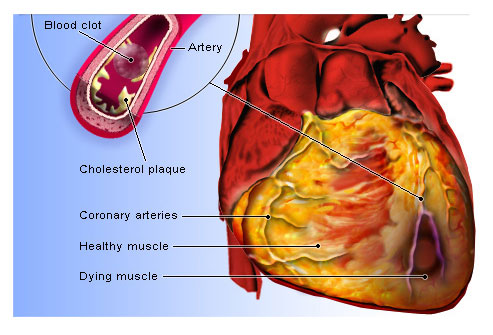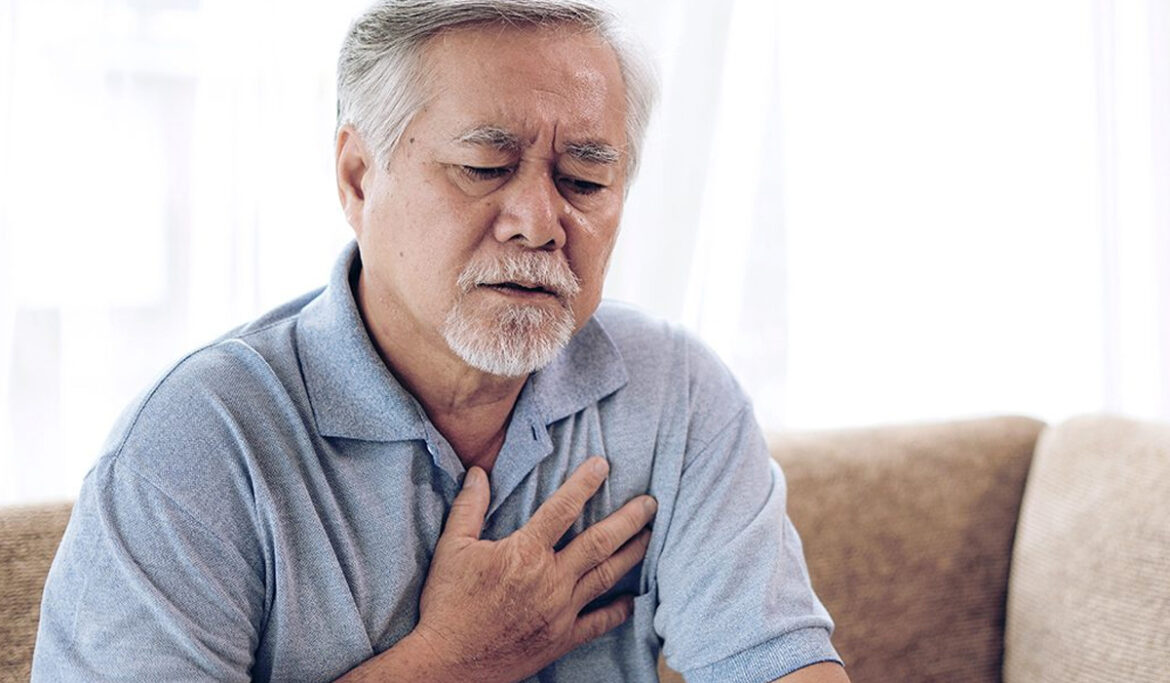What is it?

The Most common definition of heart attack is essentially an obstruction to the flow of blood towards heart. As with the other cells of the body, the cells of the muscles of the heart need oxygen to survive and function. Any hindrance to the flow of blood towards heart results in damage or death of these cells. The crucial factor is to restore the blood supply to heart as quickly as possible. Immediately call for medical emergency if you feel that you need help.
Causes

As we grow old or as with more and more fats are present in the diet, cholesterol begins to accumulate on the outer and inner walls of the blood vessels, responsible to take pure blood to the heart (called arteries). Over the period of time this cholesterol gets hardened into a substance called plaque which inhibits the blood flow. A heart attack usually occurs when this plaque breaks off and the broken pieces blocks the smaller and finer arteries which ultimately stops the flow of blood to the heart completely.
Symptoms

Symptoms of a heart attack are diverse and depends upon the condition and varies from person to person. Most commonly these symptoms are feeling of pain, pressure or discomfort in the chest. One may feel sick, sweating or shortness of breath or trouble in stomach may also occur. Moreover, one’s shoulders, neck or jaw may hurt or feel stiff.
Women and men are said to have different symptoms. Men are more prone to break into cold sweat and feel more discomfort and pain in their left arm while women have somewhat different signs of heart trouble.
Symptoms in Women

Women tend to have neck and back pain and feel shortness of breath and heartburn. They are more likely to feel uneasy, have an upset stomach and want like throwing up. Also, they may feel dizzy, light-headed and tired and may as well likely to have flu like condition or have sleeping problem a week before an actual heart attack. Unfortunately, most of these cases go un-noticed as most often the symptoms are mild and dismissed as minor.
What to Do

If you find yourself or someone with the symptoms of heart attack, call the ambulance immediately. Always keep important phone numbers of hospitals and medical emergency services handy. The person with a heart attack has better chances to survive they are treated within 90 minutes. In any case keep chewing a tablet of aspirin (unless you are allergic) as you call for help. This dissolves any blood clot and enhances the chances of survival. If you find any patient unconscious, give them Hands only CPR. This can brighten their chance of survival by up to two times.
Diagnosis

A doctor will perform an EKG or ECG upon a patient who shows the symptoms of a heart attack. An ECG is a way to measures the electrical activity of the heart which in turn can check if there is any blocked or obstructed artery. Another way to measure a heart attack is test for the proteins that the heart cells release when they die. After an ECG, a doctor may also check for this as well if they need any further investigation.
Treatment

The first priority of any doctor would be to restore the blood supply to heart as soon as possible. The person may be recommended drugs that diffuse the blood clots. Most likely he/she may have to go through a procedure called angiogram in which a tiny tube with a tiny balloon is inserted through your artery. This opens up the artery and presses the plaque against the walls to ensure smooth blood flow. A doctor may also put a small, mesh tube, known as stent within your artery to make sure that remains obstruction-free.
[Read more about Cardiology Treatment in India]
What puts you at Risk?

Age is a big factor and as one grows old the walls of the arteries gets hardened with the accumulation of more and more cholesterol. Amongst the genders, men are more likely to suffer from heart attack than women. On the other hand, family history, smoking, stress, depression, lack of exercise, diabetes and high blood pressure significantly raises the odds of a person getting a heart attack.
Prevention

Smoking is a major cause of heart trouble around the world and thus if you smoke you must consider stopping it immediately. On the other hand, preventive measures goes a long way in saving one from a heart attack. Eat a right amount of diet along with exercising about 30 minutes every day, 5 days a week. Moreover, eating plenty of fruits, whole grains and vegetables helps a lot in keeping your arteries healthy. For people more prone to heart trouble, taking a daily dose of aspirin can also benefit. However, you need to consult your doctor to check its suitability. Include positive ways and follow a constructive life style to remain stress-free.
Life after a Heart Attack

There is no need to worry or feel depressed if you suffered from a heart attack. You will be discharged from the hospital within few days and can resume to your normal lifestyle. You may get your fitness program from the doctor. Learn to stay happy and follow a heart-healthy living. Your cardiac rehab program will help you to come out of any stress or negative feeling. Keep in touch with your counsellors in case you need any psychological help.
Find an Affordable Cardiology Treatment Packages
Also read:
A visual guide to heart disease
10 Tips for a Healthy Heart
